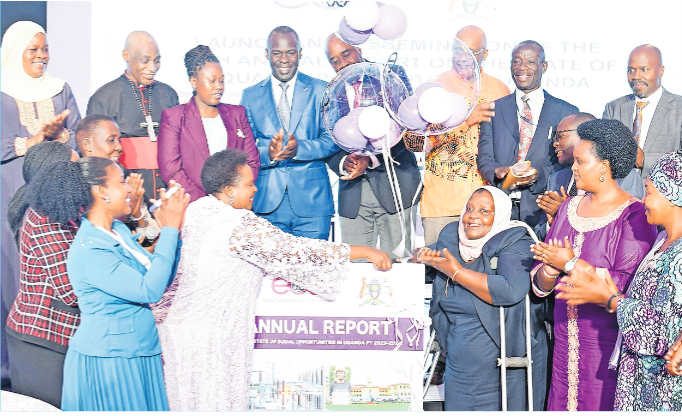Double taxation taking toll on small businesses, says report

Front row: Minister for Gender, Labour and Social Development Betty Amongi (second left) and the Equal Opportunities Commission (EOC) Chairperson Safia Nalule (fourth right) launch the 11th EOC report on the state of equal opportunities in Uganda for the FY2023/2024. PHOTO | SHABIBAH NAKIRIGYA
What you need to know:
- President Museveni has repeatedly criticised the Uganda Revenue Authority (URA) for not collecting enough taxes, particularly pointing out the large share of economic activity in Uganda that remains informal and untaxed.
The Equal Opportunities Commission wants tax policy reviewed to protect citizens from unfair and high taxes.
Uganda lacks a clear and comprehensive taxation policy, which has resulted in an unfair tax burden on certain segments of the population, according to a new Equal Opportunity Commission (EOC) report.
The "State of Equal Opportunities in Uganda FY 2023/2024" report, released on Wednesday, shows that a tax system can either be progressive—where high-income earners are taxed more than the low-income earners—or repressive—where the high and low-income earners pay the same tax, which is however burdensome on the low-income earners.
The EOC points out that taxpayers in Uganda often face multiple taxation, with different authorities imposing taxes or legal fees on the same income. For example, a business may be required to pay corporate tax to the central government while also paying local council taxes on the same revenue. Then there is a widespread lack of awareness about taxes, with many citizens unaware of the taxes they need to pay or how the tax system works.
The report stresses that while taxation can be a tool for raising government revenue, controlling prices, and redistributing wealth, it can exacerbate inequality if not managed properly.
The EOC also highlights that bureaucratic inefficiencies and corruption often obstruct access to reliable tax information, prompting some taxpayers to resort to informal channels or even bribes, undermining the integrity of the system.
Public perception of high and unjust taxes further fuels resistance to compliance, making trust in the effective use of tax revenues essential for improving tax compliance.
President Museveni has repeatedly criticised the Uganda Revenue Authority (URA) for not collecting enough taxes, particularly pointing out the large share of economic activity in Uganda that remains informal and untaxed.
In an October 31 statement, he compared Uganda’s tax-to-GDP ratio, currently at 11 percent, with European nations, where countries like Denmark (46.3 percent), France (45.4 percent), and Sweden (42.9 percent) manage to collect higher proportions of their GDP in taxes. He called for URA to improve its efforts to increase Uganda’s tax revenues.
EOC Chairperson Safia Nalule Juuko has called on agencies like URA to conduct mass sensitisation campaigns and consolidate the tax system to ensure no group is unfairly burdened.
“The government is losing significant revenue due to the lack of a proper taxation system, and many Ugandans are tax defaulters simply because they do not know what they are supposed to pay,” she said.
The EOC report also indicates that very few heads of households pay income taxes, with only 1.4 percent of those surveyed in the Uganda National Household Survey (UNHS) dataset reporting income tax payments.
A separate survey of small businesses indicated that they face a heavier burden from local government fees compared to taxes URA collected.
Overall, income taxes were found to have a minimal effect on poverty and inequality. On the other hand, value added tax (VAT) impacts everyone, from the poorest to the richest.
For the poorest households, monthly consumption decreases by 11 percent after accounting for VAT, while the richest see a 12 percent reduction.
The EOC also revealed that eliminating VAT could lead to a reduction in poverty by approximately two percentage points; however, completely removing VAT is impractical due to the government’s revenue needs.
Exempting essential items such as salt, firewood, matchboxes, household candles, bathing soap, and water, for example, could result in a 0.17 percent decrease in poverty, but VAT’s overall effect on inequality is minimal.
About excise duty
According to the report, when it comes to excise duty, its influence on consumption, poverty, and inequality is less significant than that of VAT. The impact of excise duty on poverty and inequality is relatively low. When it comes to small and micro businesses, local government fees pose a greater challenge than income taxes.
The Commission recommends revising the rates for licences and fees to reflect the size of the business, ensuring that larger businesses pay higher trade licence fees than micro and small enterprises.
“Currently, trade license fees are determined by location, resulting in micro and large businesses in the same area paying the same amount, which is an unfair tax practice,” part of the reports read.
The EOC has proposed a review of Uganda’s tax policy and devise initiatives that boost compliance and prevent businesses from being overwhelmed by informal fees.
Tax exemptions
The Equal Opportunities Commission report for FY2023/2024urges the government to exempt basic items like salt, candles, and kerosene from value added tax (VAT). Salt, for example, was exempt from VAT between 2008 and 2014, but this exemption was lifted in 2014, resulting in an immediate increase in salt prices.
The EOC has also urged the government to identify taxpayers to build a rapport and support those who have been compliant but are struggling to generate revenue. Instead of solely relying on heavy taxation, the EOC wants tax authorities to explore ways to empower these individuals and businesses to start paying tax.




